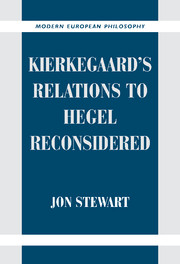Book contents
- Frontmatter
- Contents
- Acknowledgements
- Abbreviations of Primary Texts
- Preface
- Introduction
- 1 Kierkegaard and Danish Hegelianism
- 2 Traces of Hegel in From the Papers of One Still Living and the Early Works
- 3 The Ironic Thesis and Hegel's Presence in The Concept of Irony
- 4 Hegel's Aufhebung and Kierkegaard's Either/Or
- 5 Kierkegaard's Polemic with Martensen in Johannes Climacus, or De omnibus dubitandum est
- 6 Kierkegaard's Repetition and Hegel's Dialectical Mediation
- 7 Hegel's View of Moral Conscience and Kierkegaard's Interpretation of Abraham
- 8 Martensen's Doctrine of Immanence and Kierkegaard's Transcendence in the Philosophical Fragments
- 9 The Dispute with Adler in The Concept of Anxiety
- 10 The Polemic with Heiberg in Prefaces
- 11 Subjective and Objective Thinking: Hegel in the Concluding Unscientific Postscript
- 12 Adler's Confusions and the Results of Hegel's Philosophy
- 13 Kierkegaard's Phenomenology of Despair in The Sickness unto Death
- 14 Kierkegaard and the Development of Nineteenth-Century Continental Philosophy: Conclusions, Reflections, and Reevaluations
- Foreign Language Summaries
- Bibliographies
- Subject Index
- Index of Persons
2 - Traces of Hegel in From the Papers of One Still Living and the Early Works
Published online by Cambridge University Press: 13 March 2010
- Frontmatter
- Contents
- Acknowledgements
- Abbreviations of Primary Texts
- Preface
- Introduction
- 1 Kierkegaard and Danish Hegelianism
- 2 Traces of Hegel in From the Papers of One Still Living and the Early Works
- 3 The Ironic Thesis and Hegel's Presence in The Concept of Irony
- 4 Hegel's Aufhebung and Kierkegaard's Either/Or
- 5 Kierkegaard's Polemic with Martensen in Johannes Climacus, or De omnibus dubitandum est
- 6 Kierkegaard's Repetition and Hegel's Dialectical Mediation
- 7 Hegel's View of Moral Conscience and Kierkegaard's Interpretation of Abraham
- 8 Martensen's Doctrine of Immanence and Kierkegaard's Transcendence in the Philosophical Fragments
- 9 The Dispute with Adler in The Concept of Anxiety
- 10 The Polemic with Heiberg in Prefaces
- 11 Subjective and Objective Thinking: Hegel in the Concluding Unscientific Postscript
- 12 Adler's Confusions and the Results of Hegel's Philosophy
- 13 Kierkegaard's Phenomenology of Despair in The Sickness unto Death
- 14 Kierkegaard and the Development of Nineteenth-Century Continental Philosophy: Conclusions, Reflections, and Reevaluations
- Foreign Language Summaries
- Bibliographies
- Subject Index
- Index of Persons
Summary
In the present chapter I wish to embark on the examination of Kierkegaard's texts by analyzing the references to Hegel's philosophy in the published works and unpublished journals during the period immediately preceding his dissertation, The Concept of Irony (1841) – the period from late 1834, when the first article appeared, until the fall of 1838 when From the Papers of One Still Living was published. This will help to give some idea of Kierkegaard's basic disposition toward Hegel as he set about writing his dissertation and embarked on a literary career. Thus, in this chapter Kierkegaard's juvenilia will be explored for clues about his relation to Hegel. In this context there are four different texts to be considered.
The first text comes from the scattered articles that Kierkegaard, as a young student, wrote for Heiberg's journal Kjøbenhavns flyvende Post. These articles are concerned primarily with local social and political issues of the day. Generally speaking, they contain no sign of a discussion of Hegel or Hegelianism and thus are not in any obvious way of any particular significance for the present study. However, the first article, “Another Defense of Woman's Great Abilities,” is relevant indirectly since, although it is not concerned with any particular aspect of Hegel's philosophy, it is a response to some of Heiberg's remarks in his deeply Hegelian work, On the Significance of Philosophy for the Present Age. The first section of the present chapter will therefore be dedicated to this short article.
- Type
- Chapter
- Information
- Kierkegaard's Relations to Hegel Reconsidered , pp. 90 - 131Publisher: Cambridge University PressPrint publication year: 2003



